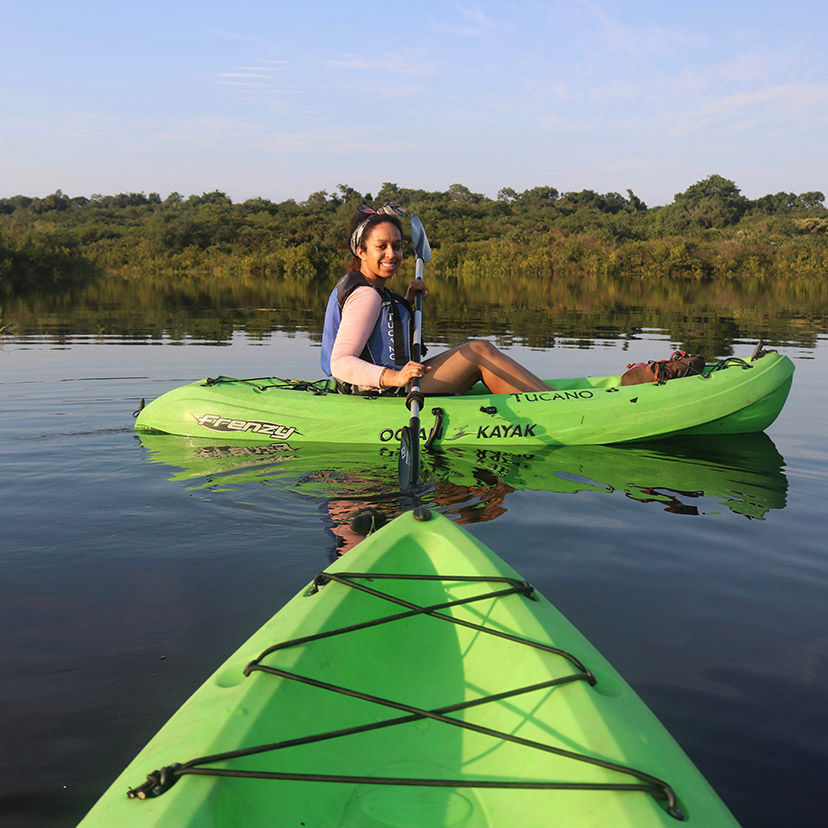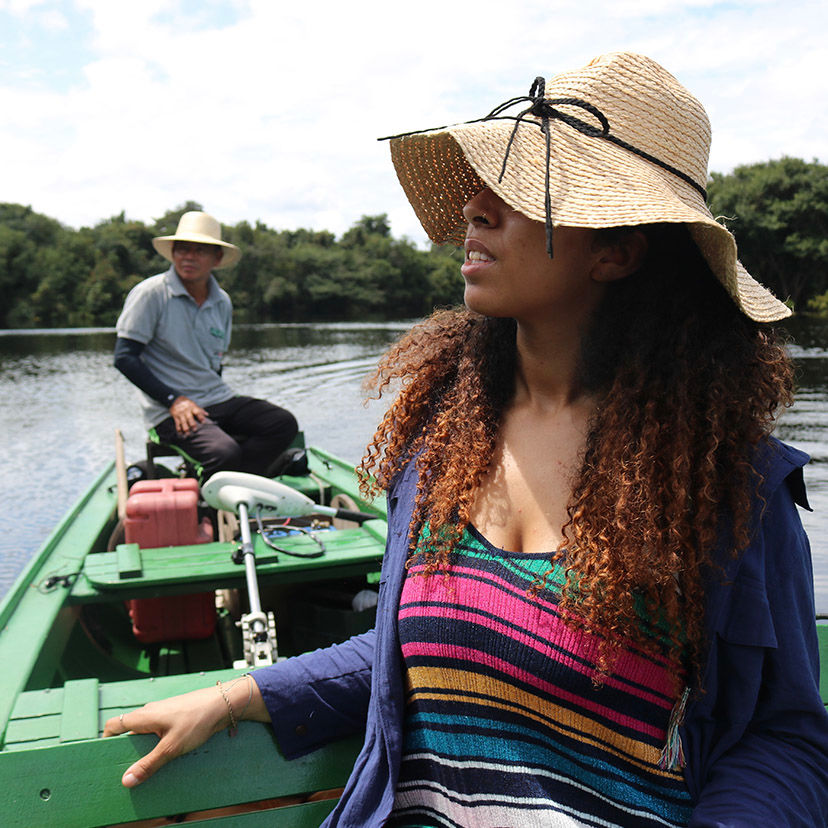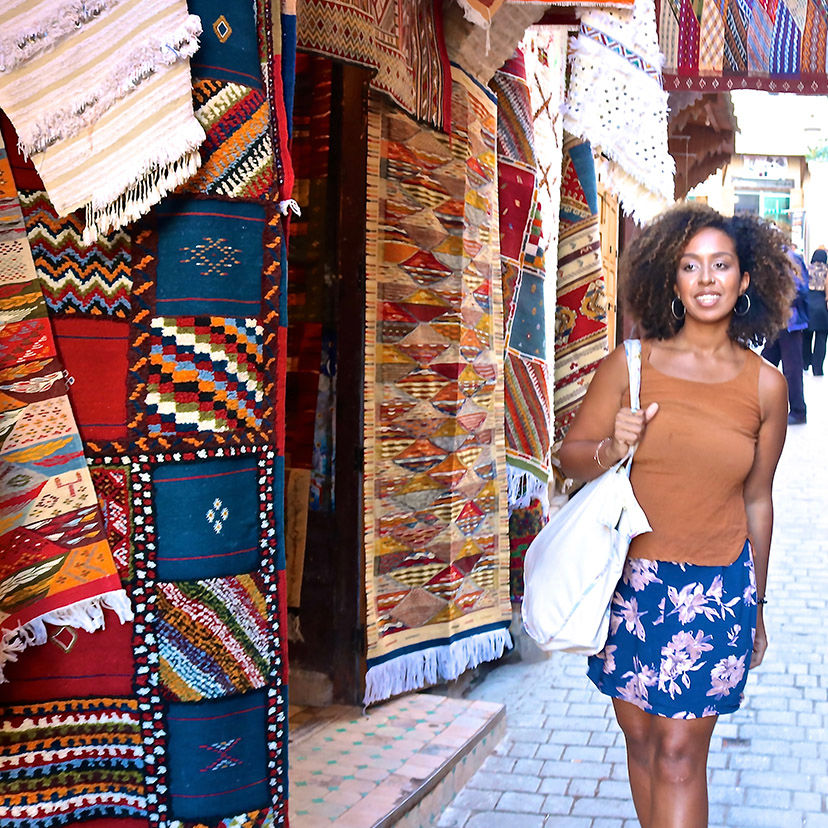UO Book Club: Interview with Georgina Lawton Author of Black Girls Take World
We caught up with Georgina Lawton, travel writer and author of Black Girls Take World: The Travel Bible for Black Women with Boundless Wanderlust — a new and inspirational travel bible that will give you the confidence to travel alone and help you engage with your unexplored world. From must-see countries, best travel stories and the impact The Black Travel Movement has had on the community, Georgina takes us through solo travel from her perspective.



How did you go about writing Black Girls Take World?
I started my journalism career after University by doing a lot of freelance travel writing, which involved knocking on doors, cold pitching and asking editors if I could write pieces outside my role. I moved to New York City at 23 with zero contacts and began freelance writing for a women’s lifestyle site. Eventually, I was invited on my first press trip to Vietnam on behalf of that website and used that trip to network, create lots of travel content for my Instagram and write about things that interested me beyond my brand and site assignments, such as the hair extension trade in Asia. After that trip I decided to carry on travelling and writing, which resulted in working with the travel brand Intrepid as well as writing for Time Out London and Travel + Leisure when I returned to the UK. I was then approached by Hardie Grant to write this book in 2019 — all the self-promotion paid off! I had envisaged completing this book in Brazil or Bali but the pandemic stopped me and I spent 2020 in my family home in south London writing it in my garden with all my notes from over the years, and it was still great.
Did you find it easy to be spontaneous whilst travelling or was there a lot of careful planning?
I’m definitely not an over planner — when travelling solo you often meet people and hear about places you hadn’t considered. Suddenly everything will change and you’ll find yourself sucked into a 4x4 on a random group trip to some spot you’ve never heard of and it’s usually great. But as I’ve got older and have found myself living in Lisbon in the era of a pandemic, I’ve realised some planning is essential in order to protect yourself and your finances. Researching the healthcare system abroad in case things go wrong is essential, as is travel insurance which I always used to scrimp on. Having a back-up travel plan in terms of locations/accommodation is also important as lockdowns and COVID outbreaks can change everything at the drop of a hat.
Advice you’d give to someone considering travelling solo… just go for it. The world is wide and most people are good! For black and brown women worried about othering, sexual violence, or discrimination abroad, I’d also advise keeping things in perspective. We hear of terrible, violent stories all the time, but not of the innumerous positive experiences that take place every day. And often when we look at gender violence in our own ‘western’ home countries, we can see there are just as many, if not more, risks to our health at home.
The Black Travel Movement began in 2013 and has supported black women finding the freedom to travel. Tell us about the positive impact this movement has had on the community?
Anti-blackness is worldwide and began, in times of slavery, with the restriction of free movement on black bodies. Today that drip-feeds into tired notions that black people don’t ‘like’ to do certain outdoor activities, or are more at risk when they travel alone, so therefore tend not to do so. These stereotypes are rebuked when black travellers are equipped with the knowledge and inspiration they need to travel. When we have trailblazers like Jessica Nabongo (the first black woman to travel to every country in the world, who is also featured in the book), it shows the world that we are out here and we are capable. When we have people like Rhiane Fatinikun (founder of Black Girls Hike, who is also featured in the book), or Evitta Robinson (who started the group Nomadness Travel Tribe) organising retreats, trips and experiences for black people, it also builds community and spreads knowledge. On a personal level, when we travel to black spaces, or travel with other people who look like us and share some of our life experiences, I’ve found that it can help us connect more deeply with our heritage and understand more about our place in the world. We often talk about the power of ‘representation’ in the media without ever really measuring its impact, but the spending power of black travelers is colossal: in 2019 we contributed $109 billion on holidays according to a study by marketing group MMGY Global, so the demand is there.
I started my journalism career after University by doing a lot of freelance travel writing, which involved knocking on doors, cold pitching and asking editors if I could write pieces outside my role. I moved to New York City at 23 with zero contacts and began freelance writing for a women’s lifestyle site. Eventually, I was invited on my first press trip to Vietnam on behalf of that website and used that trip to network, create lots of travel content for my Instagram and write about things that interested me beyond my brand and site assignments, such as the hair extension trade in Asia. After that trip I decided to carry on travelling and writing, which resulted in working with the travel brand Intrepid as well as writing for Time Out London and Travel + Leisure when I returned to the UK. I was then approached by Hardie Grant to write this book in 2019 — all the self-promotion paid off! I had envisaged completing this book in Brazil or Bali but the pandemic stopped me and I spent 2020 in my family home in south London writing it in my garden with all my notes from over the years, and it was still great.
Did you find it easy to be spontaneous whilst travelling or was there a lot of careful planning?
I’m definitely not an over planner — when travelling solo you often meet people and hear about places you hadn’t considered. Suddenly everything will change and you’ll find yourself sucked into a 4x4 on a random group trip to some spot you’ve never heard of and it’s usually great. But as I’ve got older and have found myself living in Lisbon in the era of a pandemic, I’ve realised some planning is essential in order to protect yourself and your finances. Researching the healthcare system abroad in case things go wrong is essential, as is travel insurance which I always used to scrimp on. Having a back-up travel plan in terms of locations/accommodation is also important as lockdowns and COVID outbreaks can change everything at the drop of a hat.
Advice you’d give to someone considering travelling solo… just go for it. The world is wide and most people are good! For black and brown women worried about othering, sexual violence, or discrimination abroad, I’d also advise keeping things in perspective. We hear of terrible, violent stories all the time, but not of the innumerous positive experiences that take place every day. And often when we look at gender violence in our own ‘western’ home countries, we can see there are just as many, if not more, risks to our health at home.
The Black Travel Movement began in 2013 and has supported black women finding the freedom to travel. Tell us about the positive impact this movement has had on the community?
Anti-blackness is worldwide and began, in times of slavery, with the restriction of free movement on black bodies. Today that drip-feeds into tired notions that black people don’t ‘like’ to do certain outdoor activities, or are more at risk when they travel alone, so therefore tend not to do so. These stereotypes are rebuked when black travellers are equipped with the knowledge and inspiration they need to travel. When we have trailblazers like Jessica Nabongo (the first black woman to travel to every country in the world, who is also featured in the book), it shows the world that we are out here and we are capable. When we have people like Rhiane Fatinikun (founder of Black Girls Hike, who is also featured in the book), or Evitta Robinson (who started the group Nomadness Travel Tribe) organising retreats, trips and experiences for black people, it also builds community and spreads knowledge. On a personal level, when we travel to black spaces, or travel with other people who look like us and share some of our life experiences, I’ve found that it can help us connect more deeply with our heritage and understand more about our place in the world. We often talk about the power of ‘representation’ in the media without ever really measuring its impact, but the spending power of black travelers is colossal: in 2019 we contributed $109 billion on holidays according to a study by marketing group MMGY Global, so the demand is there.
What’s one thing you’ve learnt from a local that you’d like to pass on?
To chill out — nothing is ever as bad as it seems. That was absorbed from a few friends I met on the Corn Islands off the coast of Nicaragua. I’ve never come across a slower, more serene pace of life, so obviously I lived there for three months...
Best travel story so far:
I was nearly arrested in Cuba when I spent a month there in 2017. This county is a former communist dictatorship and even though it’s opened up a lot in the past 10 years, there are still quite a few rules I wasn’t acquainted with. One is that you can only hitch-hike around the country if you are a local, which is an attempt to keep the tourist money circulating in certain areas. When I was accepted into an old 1950s car (they are still on the roads there) with locals, I didn’t know of this rule. By chance we were pulled over and the police began checking everyone’s luggage. I was told to say nothing by the other passengers but didn’t realise why. Suddenly the police pulled out my Lonely Planet Guide to Havana and started shouting! We were all hauled to the station and the driver was taken in for questioning. They eventually let us go but I couldn’t continue my journey and had to call my homestay to get them to collect me — they explained the situation because I was still perplexed! This is an example of one of the highs and lows of travelling when you ‘pass’ as a local — the driver obviously thought I wouldn’t stand out as I looked Cuban, but unluckily for us, my tourist status was outed anyway.
Top 3 places we should visit and why?
This is so hard! For long-term living or a city-break I have to say Lisbon has a lot going for it: nine months of sun, cheap food and rent, a captivating blend of nightlife and beach culture…I’m not in a rush to head back to London, quite honestly.
For beginner’s backpacking, I was enamoured with Colombia’s Caribbean coast — from Cartagena to Santa Marta, and Palomino to Parque de Tayrona. It was the first trip I took on my own at 22 years old, and bar a lost iPhone, I had no negative experiences and met lots of great people. I keep thinking how much I want to go back! The salsa and scenery were unforgettable.
For rest and relaxation, I loved Bali way more than I thought I would. Yes, it’s full of travellers like me in high season, but it’s incredibly beautiful and has an amazing culinary scene. I also completed a lot of writing there (RACELESS, my first book and a memoir) when staying in Ubud in 2019 for three months. I’d wake up to the hum of Hindu chanting, eat some fresh fruit and take a moped ride through some jungle to my coworking spot overlooking rice fields — bliss.
3 emerging creatives you’d like to spotlight… hmm, so these aren’t so much emerging in that they’ve already fully arrived, but I love Natty Kasambala’s writing at Dazed and gal-dem, Rhiane Fatinikun the founder of the UK walking group and Instagram page, Black Girls Hike (she’s featured in the book!) and also Annette Richmond, founder of Fat Girls Hiking (also featured in the book).
What was your most recent read you couldn’t put down?
Aftershocks, a memoir by Nadia Owusu which came out in 2021 is just gorgeous. It pieces together the author’s identity and traces her journey and displaced childhood through Tanzania, England, Italy, and the States covering themes such as mental health, grief, politics, colourism. It’s incredible.
What’s next?
I’m working on a novel, and I’d also like to start a travel/lifestyle podcast for women. I’m also still doing a lot of promotion for both my nonfiction books that came out this year; RACELESS a memoir, was released in Feb and Black Girls Take World came out in June. It’s been busy but I’m beyond grateful.
To chill out — nothing is ever as bad as it seems. That was absorbed from a few friends I met on the Corn Islands off the coast of Nicaragua. I’ve never come across a slower, more serene pace of life, so obviously I lived there for three months...
Best travel story so far:
I was nearly arrested in Cuba when I spent a month there in 2017. This county is a former communist dictatorship and even though it’s opened up a lot in the past 10 years, there are still quite a few rules I wasn’t acquainted with. One is that you can only hitch-hike around the country if you are a local, which is an attempt to keep the tourist money circulating in certain areas. When I was accepted into an old 1950s car (they are still on the roads there) with locals, I didn’t know of this rule. By chance we were pulled over and the police began checking everyone’s luggage. I was told to say nothing by the other passengers but didn’t realise why. Suddenly the police pulled out my Lonely Planet Guide to Havana and started shouting! We were all hauled to the station and the driver was taken in for questioning. They eventually let us go but I couldn’t continue my journey and had to call my homestay to get them to collect me — they explained the situation because I was still perplexed! This is an example of one of the highs and lows of travelling when you ‘pass’ as a local — the driver obviously thought I wouldn’t stand out as I looked Cuban, but unluckily for us, my tourist status was outed anyway.
Top 3 places we should visit and why?
This is so hard! For long-term living or a city-break I have to say Lisbon has a lot going for it: nine months of sun, cheap food and rent, a captivating blend of nightlife and beach culture…I’m not in a rush to head back to London, quite honestly.
For beginner’s backpacking, I was enamoured with Colombia’s Caribbean coast — from Cartagena to Santa Marta, and Palomino to Parque de Tayrona. It was the first trip I took on my own at 22 years old, and bar a lost iPhone, I had no negative experiences and met lots of great people. I keep thinking how much I want to go back! The salsa and scenery were unforgettable.
For rest and relaxation, I loved Bali way more than I thought I would. Yes, it’s full of travellers like me in high season, but it’s incredibly beautiful and has an amazing culinary scene. I also completed a lot of writing there (RACELESS, my first book and a memoir) when staying in Ubud in 2019 for three months. I’d wake up to the hum of Hindu chanting, eat some fresh fruit and take a moped ride through some jungle to my coworking spot overlooking rice fields — bliss.
3 emerging creatives you’d like to spotlight… hmm, so these aren’t so much emerging in that they’ve already fully arrived, but I love Natty Kasambala’s writing at Dazed and gal-dem, Rhiane Fatinikun the founder of the UK walking group and Instagram page, Black Girls Hike (she’s featured in the book!) and also Annette Richmond, founder of Fat Girls Hiking (also featured in the book).
What was your most recent read you couldn’t put down?
Aftershocks, a memoir by Nadia Owusu which came out in 2021 is just gorgeous. It pieces together the author’s identity and traces her journey and displaced childhood through Tanzania, England, Italy, and the States covering themes such as mental health, grief, politics, colourism. It’s incredible.
What’s next?
I’m working on a novel, and I’d also like to start a travel/lifestyle podcast for women. I’m also still doing a lot of promotion for both my nonfiction books that came out this year; RACELESS a memoir, was released in Feb and Black Girls Take World came out in June. It’s been busy but I’m beyond grateful.